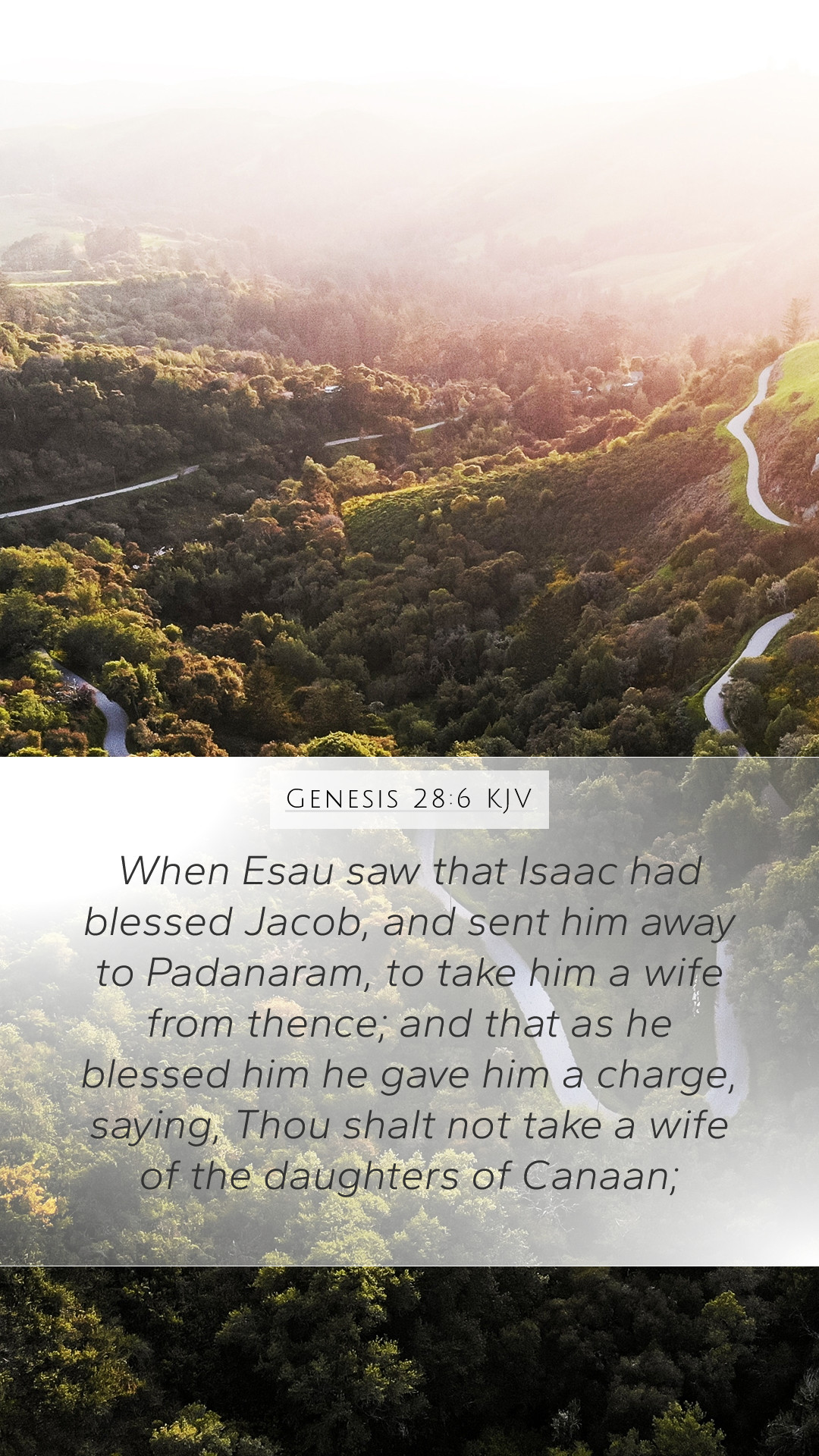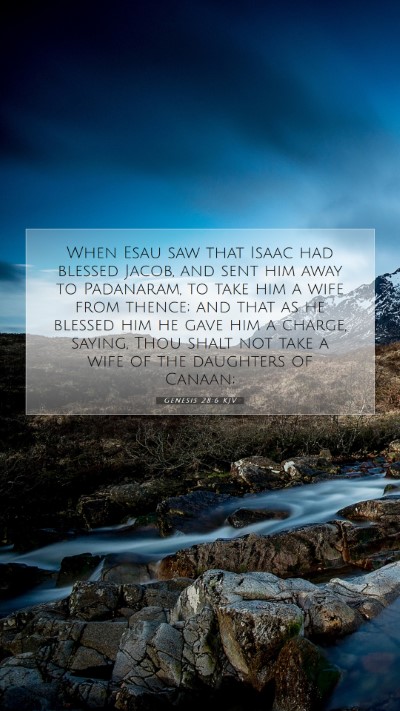Bible Verse Meaning: Genesis 28:6
Verse: "When Esau saw that Isaac had blessed Jacob and sent him away to Paddan-aram to take a wife from there, and that as he blessed him he charged him, saying, 'You shall not take a wife from the daughters of Canaan,'” (Genesis 28:6, ESV)
Overview
Genesis 28:6 describes a critical moment in the life of Jacob, as well as the ongoing conflict between Jacob and his brother Esau. This verse provides insights into familial relationships and God's plan for His chosen people. Understanding this verse can deepen one's knowledge of biblical narratives and the significance of blessings within these narratives.
Meaning of the Verse
This passage captures the aftermath of Isaac's blessing of Jacob, emphasizing the importance of obedience to God's command. The following points reflect the combined insights from public domain commentaries such as Matthew Henry, Albert Barnes, and Adam Clarke:
- Familial Tension: The blessing of Jacob and the subsequent actions of Esau reveal the tension within the family. Esau's realization of his father's blessing on Jacob adds depth to the sibling rivalry that is a recurrent theme throughout the Genesis narrative.
- Significance of Blessing: Isaac's blessing and the command to not marry Canaanite women are significant. The act of blessing was not merely ceremonial; it was a divine appointment that carried with it promises of prosperity and lineage—a concept highlighted in Genesis 12:1-3 where God promised Abraham a great nation.
- Obedience to God’s Will: The importance of marrying within one’s own faith community is highlighted here, echoing commands throughout Scripture regarding the dangers of intermarriage with those who do not share the same faith (Deuteronomy 7:3-4).
- Foreshadowing Future Events: The decision to send Jacob "to Paddan-aram" to find a wife points to future events where Jacob will encounter divine revelations. This also aligns with the broader theme of God's providence and guidance in the lives of His chosen people.
- Character of Esau: Esau's reaction to Isaac's blessing raises questions about his character. While Esau is depicted as a man of the field, he displays a lack of spiritual awareness and ultimately regrets his choices (Hebrews 12:16-17), highlighting the contrast between fleshly desires and spiritual wisdom.
Contextual Analysis
To fully grasp the meanings and implications of Genesis 28:6, it is essential to consider both its immediate context and the larger biblical narrative:
- Immediate Context: This verse follows the birthright sale and blessing of Jacob over Esau, which are pivotal events that establish God's sovereign choice. Isaac’s actions are seen as a direct alignment with God’s intention for Jacob to carry forth the blessings of Abraham.
- Historical Context: The cultural significance of marriage and family in ancient Israel plays a vital role in understanding this passage. Marriages often were arrangements made for political alliances or religious fidelity, hence the emphasis on avoiding Canaanite women.
- Theological Context: In Scripture, God often uses family dynamics to illustrate His covenant relationships and the unfolding of His redemptive plan, making this verse crucial for understanding His overarching narrative.
- Symbolism: The act of sending Jacob away signifies not just separation but a journey towards divine purpose and destiny, illustrating how God often leads His chosen people through trials and tribulations towards fulfilling His promises.
Bible Study Insights
For those engaging in bible study insights, Genesis 28:6 can be used as a focal point for various studies:
- Family Dynamics and Spirituality: Exploring how family struggles can affect one’s spiritual journey and relationship with God.
- The Importance of Godly Relationships: Discussing how to apply biblical principles regarding marriage within the faith community today.
- Understanding God’s Sovereignty: Facilitating discussions on how God’s sovereignty is evident throughout the events in Jacob's life.
Cross References
This verse connects with several other biblical passages:
- Genesis 12:1-3: God’s blessing upon Abraham, which extends to Isaac and Jacob.
- Genesis 27:1-40: The account of Isaac bestowing the blessing upon Jacob.
- Hebrews 12:16-17: A reflection on Esau's character and his loss regarding the blessings.
Conclusion
Understanding Genesis 28:6 requires examining familial relationships, cultural customs, and spiritual implications. By doing so, believers can glean applicable principles for their lives today. This verse serves as a reminder of the importance of divine guidance in both significant life choices and everyday decisions, ultimately leading one to a deeper understanding of God's will for their life.


